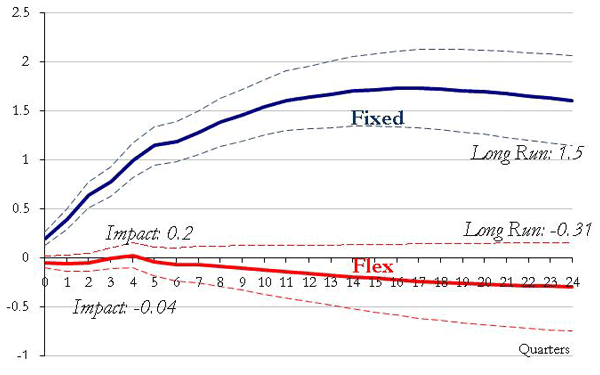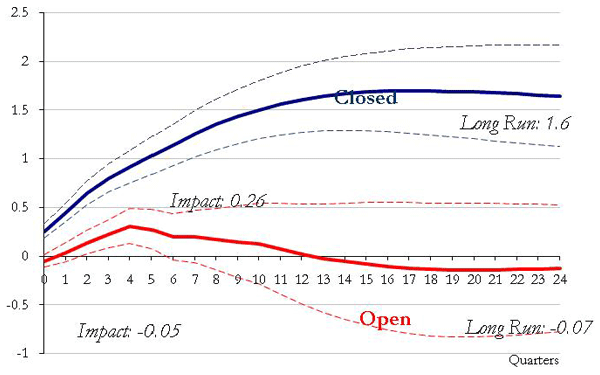Fiscal Policy Cannot Stimulate the Economy, Redux
Economics / Economic Theory Jan 03, 2010 - 01:41 AM GMTBy: MISES
 Sterling T. Terrell writes: Fiscal policy, the attempt to use government outlays and revenue to better the economy, simply does not work either a priori or in practice.
Sterling T. Terrell writes: Fiscal policy, the attempt to use government outlays and revenue to better the economy, simply does not work either a priori or in practice.
 But just ask any undergraduate student in Macroeconomics 101 about fiscal policy. They know the "correct" answer: If the economy is "too slow," the government should lower interest rates and increase government spending. If the economy is "overheated," the government should raise interest rates and decrease government spending.
But just ask any undergraduate student in Macroeconomics 101 about fiscal policy. They know the "correct" answer: If the economy is "too slow," the government should lower interest rates and increase government spending. If the economy is "overheated," the government should raise interest rates and decrease government spending.
The horrors of monetary policy aside, fiscal policy cannot stimulate the economy. As we know, the government has no money of its own. It has only the power to tax and spend the money of others. There can only be a transfer that takes place, not a creation of wealth: jobs in X are gained, but jobs in Y are lost.
However, this transfer is actually a loss. Taxing away a person's ability to fulfill his own wants and then providing him with things he may not care about makes him worse off. This process condescendingly supposes that individuals cannot decide for themselves what they need.
Furthermore, taxing is not done in a uniform manner. Progressive income taxes, double corporate taxes, and estate taxes all disproportionally take from the people that make, create, invest, and speculate to the betterment of all. Henry Hazlitt famously explained this in his well-known work Economics in One Lesson (see chapter five).
The common objection to such a theoretical analysis is: "Well. No. You have to look at the fiscal multiplier. One dollar in government spending, once it filters through the economy, will make GDP increase by more than one dollar."
Let us agree to play the empirical game, momentarily.
New work done by Ethan Ilzetzki, Enrique Mendoza, and Carlos Vegh, covering data from 45 countries from 1960 to 2007, casts doubt on the validity of the multiplier in many cases.
Our findings lead to the usual "it depends" answer to the size of the fiscal multiplier question. As those familiar with macroeconomic theory likely anticipated, the size of the fiscal multipliers critically depends on key characteristics of the economy (closed versus open, predetermined versus flexible exchange rate regimes, high versus low debt) or on the type of aggregate being considered (government consumption versus government investment). Policymakers would therefore be well -served in taking into account a given country's characteristics in evaluating the benefits of any fiscal stimulus package.
Read the details for yourself, but the differences they found seem to be the largest when comparing fixed- and flexible-exchange-rate economies,

and closed and open economies:

This all suggests that in a country such as the United States the fiscal multiplier is virtually zero. Robert Barrow agrees.
So, in addition to fiscal policy taking away the freedom to choose, robbing X to hand it to Y, and penalizing the very people that improve our lives, it also fails empirically. Even if it did not, as is seemingly the case in certain closed economies graphed above, there would still not be a valid reason to oppress people further by taxing away their money for "stimulation." By that rationale, a fiscal policy taking up 95% of GDP would make people better off than a fiscal policy taking up 5% of GDP. Clearly, this is not the case.
Earlier this year, Frank Shostak predicted that the recent fiscal stimulus would not help the US economy. Looking at unemployment, he was right.
Fiscal policy does not work, a priori or empirically, but the Austrians already knew that.
Sterling T. Terrell is an economist and writer living outside of San Antonio, TX. Send him mail. See Sterling T. Terrell's article archives.![]()
© 2010 Copyright Sterling T. Terrell - All Rights Reserved
Disclaimer: The above is a matter of opinion provided for general information purposes only and is not intended as investment advice. Information and analysis above are derived from sources and utilising methods believed to be reliable, but we cannot accept responsibility for any losses you may incur as a result of this analysis. Individuals should consult with their personal financial advisors.
© 2005-2022 http://www.MarketOracle.co.uk - The Market Oracle is a FREE Daily Financial Markets Analysis & Forecasting online publication.



